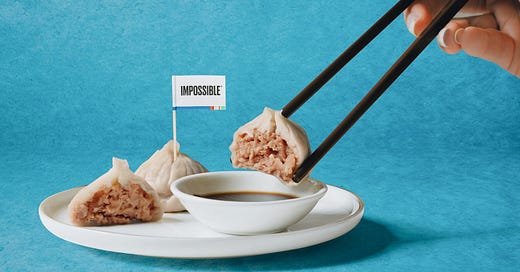Veggie Digest #7
Algae-based meat, beer made from hydroponically grown hops, carbon offsetting, and much more.
Welcome to the latest installment of the Veggie Digest, the newsletter that keeps you on top of the latest in sustainable food innovations, food systems, and emerging trends.
Headlines and Trends
A curated roundup of interesting food tech news from the past week.
📰 Impossible Foods Is Launching Meatless Pork (CNBC)
Impossible Foods has created a plant-based pork claimed to be tastier and healthier than actual pork from a pig. The product is made primarily from soy and has the same amount of protein as the real deal, but with no cholesterol, less saturated fat, and fewer calories. Additionally, Impossible Foods administered a blind taste test and learned that 54% of Hong Kong consumers preferred the plant-based pork product. The company’s meatless ground pork will first be available in the U.S, Hong Kong, and Singapore. You can learn more about it on the official Impossible Pork info page.
📰 AeroFarms Is Supplying the Hops for Goose Island’s Latest IPA (TechCrunch)
Goose Island Beer Company has collaborated with AeroFarms, an indoor vertical farming company, to craft Hail Hydro’s beer, a brew made with hops grown hydroponically. The hydro-cascade hops plants are submerged in AeroFarms’ patented growth medium and fed nutrient-rich water. This method is unaffected by changes in weather, soil conditions, or any other environmental factors, so they can be harvested year-round. These methods also use fewer resources, 95% less water, and zero pesticides while producing 390 times greater yields.
📰 Food Fraud and Counterfeit Cotton: The Detectives Untangling the Global Supply Chain (The Guardian)
Here’s a job they don’t teach you about in school. Global supply chains are complicated, multi-layered, and lacking in transparency, some companies must hire third-party experts to validate the provenance of their products (example: did that single-origin coffee really come from where the seller claims it did?). These agricultural detectives use sophisticated chemical analyses to identify a product’s distinctive signature based on trace isotopes and other telltale elemental signals.
📰 Tofurky Partners with Triton Algae to Bring Algae-Based Meat Alternatives to Market (Food Dive)
Tofurky is partnering with future food startup, Triton Algae Innovations to bring new algae-based meat innovations to market. Algae is growing popular because it can be naturally produced anywhere in abundance, has a low carbon footprint, and has a high nutritional profile. Triton’s “essential red” algae is rich in protein, along with Vitamin A and iron, and will be an essential ingredient in future product formulas.
📰 Developing the Next Generation of Plant-Based Fish (Vegconomist)
In Germany, data shows that plant-based fish had the highest growth rate of all plant-based food categories, growing by 623% over the two years. Although the current selection of alternative seafood products is limited, the sector is increasing at an accelerated rate globally. The Consumer Advice Centre in Hessen recently did a survey to learn what people want in plant-based fish products and found that a recognizably fish flavor, low price points, and key fish components such as omega-3 fatty acids, iodine, and Vitamin B12 are crucial to consumers.
Food Lingo: “Blue Food”
There’s a lot of jargon in the food technology and sustainability space. Each week I highlight an important concept to improve your food lingo literacy.
Blue Food is food derived from aquatic animals, plants, or algae that are caught or cultivated in freshwater and marine environments. Around three billion people rely on blue food as a major protein source which pushes marine ecosystems to their limits.
📰 Transforming Blue Food Systems (The Hill)
Fish, shellfish, and algae have more nutritional benefits and sustainability gains than food from land animals.
The ocean is under immense pressure and overfished with the growth in demand for blue foods increasing and set to roughly double by 2050
Fish stocks can recover and replenish if they are managed carefully
The Blue Food Assessment (BFA) provides comprehensive overviews of how blue foods play a vital role in addressing climate change, sustainable development, and malnutrition.
Sustainability Beyond Food
A handful of non-food-specific pieces to keep you abreast of other environmental items of interest.
📰 Could Tiny Homes Be The Sustainable Housing Solution Our Planet Needs? (TED)
Tiny homes have become increasingly popular, which is great for the environment as they require fewer materials to build and produce fewer emissions than larger homes. Additionally, a study found that people who live in tiny homes purchase fewer items, recycle more, and eat locally after moving into a smaller space.
📰 How Carbon Offsetting Works (Tired Earth)
Carbon offsetting involves compensating for the amount of carbon emissions generated to balance it out. However, because offsetting is voluntary and unregulated, it “allows frequent flyers to assuage their guilt and the aviation industry to grow.”
📰 Volvo Is Going Leather-Free (Live Kindly)
Volvo wants all of its electric models to be leather-free by 2030 as a part of the company’s “climate action” plan to become more sustainable. According to Volvo, the switch from leather is a result of the environmental impact of cattle farming which includes greenhouse gas emissions and deforestation. The company is instead looking to use a textile known as Nordico, which is made from recycled materials such as plastic bottles. Volvo will also be incorporating “recycled and bio-based” content in its new cars to become a fully circular business by 2040.
—-
Thank you for reading the Veggie Digest newsletter. If you’re enjoying it, be sure to share it with your friends and colleagues.
If this newsletter was forwarded to you, visit this link to subscribe.
You can reach me by replying directly to this email or by adding a comment on Substack.


